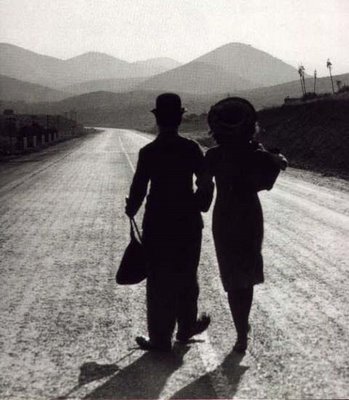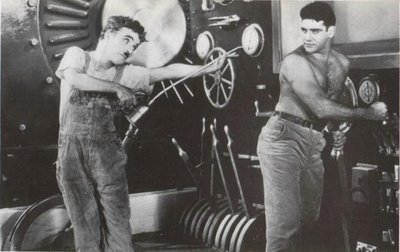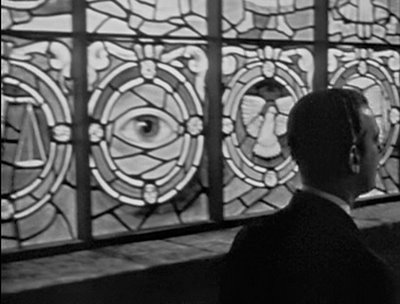
As I may have mentioned elsewhere, I teach part-time through a community college program at a local correctional facility. I handle the English department offerings, which means I cover as much of the catalogue as we can--given our textbook resources--including British and American literature, College Composition I and II, Introduction to Fiction and Drama, and, once in a great while, creative writing. And about once a year I teach Introduction to Film Art--except for a period in which most Illinois Department of Corrections video equipment was locked away after the postmortem release of a David Speck video in which he taped himself and other men having a relentlessly ugly good ol' time. (And I am sorry even to have mentioned this; your curiosity might lead to internet research--and I promise you, all you will find is bad craziness.)
I've used a variety of films over the years with equally varied success. It is sometimes a disheartening experience--my students do not always appreciate the films I choose--which is true even outside of the strange environment of a prison; still, it is discouraging to hear those loud yawns during, say, 2001--although I guess I should've seen that coming--let alone during The Big Heat or On the Waterfront. Goodfellas is often appreciated--and I intend no stereotyping, because so is Chaplin. A few students usually drop the course after the first class--I suspect it's in part the film selections, but the sticking point may be the realization that we are actively observing movies, and that is not nearly as much fun as watching them.
Anyway, I'm two weeks into the term and thought I'd report on the proceedings so far. (And I must mention that the shape of the course this time around was largely determined by the suggestions of a good friend. Sneaky me: All I had to do was dangle the opportunity--What Would Michael Do?--and he did most of my work for me. And by the way, about a week after we corresponded I received an email from his son suggesting different films for each section of the course. Thank you, Paul, for reminding me I should've chosen The Wizard of Oz to illustrate Technicolor. Duh.)
 As I commented above, Chaplin has the ability to get just about anyone on his side. We started with Modern Times, and in my students' responses I noticed something about Chaplin's greatness. The biggest laughs came from the small touches: the grace with which he twists noses and nipples with his wrenches, driven assembly-line-mad until he cannot resist tightening everything; and, during the black maria escape, Chaplin's gentle gesture of smoothing the bald pate of the cop regaining consciousness before bopping him on the head with his own billy club. While the reception for Modern Times was, as with everything, a mixed affair, overall they found it a film easy to enjoy, even passively. They especially responded to his "institutionalization," in which he hesitated leaving prison after getting used to three hots and a flop, and his dutiful optimism, smiling all the way.
As I commented above, Chaplin has the ability to get just about anyone on his side. We started with Modern Times, and in my students' responses I noticed something about Chaplin's greatness. The biggest laughs came from the small touches: the grace with which he twists noses and nipples with his wrenches, driven assembly-line-mad until he cannot resist tightening everything; and, during the black maria escape, Chaplin's gentle gesture of smoothing the bald pate of the cop regaining consciousness before bopping him on the head with his own billy club. While the reception for Modern Times was, as with everything, a mixed affair, overall they found it a film easy to enjoy, even passively. They especially responded to his "institutionalization," in which he hesitated leaving prison after getting used to three hots and a flop, and his dutiful optimism, smiling all the way.This past week we watched Citizen Kane, and I kept pausing the movie--we recently upgraded to DVD, which already has changed the way I teach the course in expected but welcome ways (at least welcomed by me). I wanted them to see the rewards of active viewing--and of course Welles gives you something to consider every ten seconds--make that three. They were especially impressed by the dissolve from Susan's defiant face after Kane slaps her to the interior shot of the stained-glass window in Xanadu featuring an eye that appears in practically the exact spot occupied by Susan's stare-down. I asked them to consider the implications of exerting such energy on moments we do not consciously see--unless we look. I think I began to convince them that great movies are intentional, even if no one realizes it--including sometimes the filmmakers.
 After Kane we watched a scene from Sweet Smell of Success: J.J. Hunsecker holding court at his restaurant table, juggling stooges and hangers-on, disdainful and self-impressed. As I mentioned in my previous blog, it's Kane without Xanadu, another newspaperman declaring un-principles.
After Kane we watched a scene from Sweet Smell of Success: J.J. Hunsecker holding court at his restaurant table, juggling stooges and hangers-on, disdainful and self-impressed. As I mentioned in my previous blog, it's Kane without Xanadu, another newspaperman declaring un-principles.Next week I'll let you know what they made of Singin' in the Rain and the effect of all that singin'--and dancin' and color. Wish me luck.
No comments:
Post a Comment